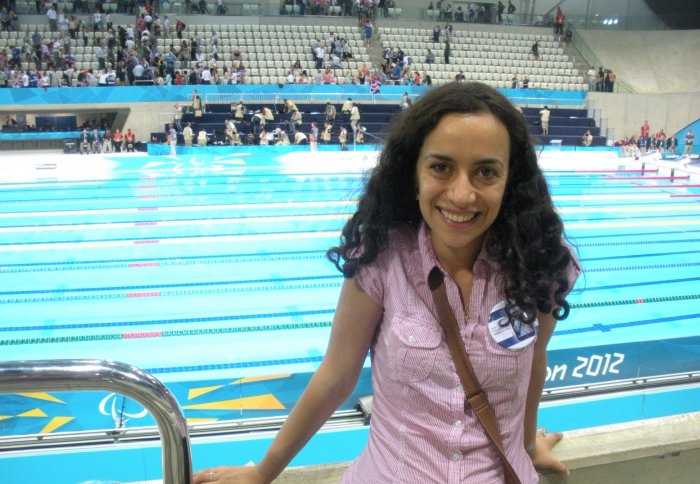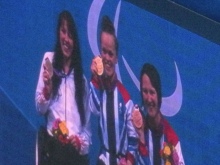The road to Eton Manor: my Paralympic conversion

Paralympic London 2012 event report by Deborah Navarro Rosenblatt
"Like most Londoners, I came down last month with a sudden bout of Post-Olympic Depression Syndrome. Valiantly trying to beat this illness and determined to extend my Olympic experience I scrambled for an antidote: tickets for the Paralympics.
Research Assistant in Nutritional Epidemiology, Deborah Navarro Rosenblatt (Public Health), reports on her experience of the Paralympics Games:
"I like so many others, I made the error of approaching the Paralympics as a substitute Olympics but over the course of the Games I found out just how misguided this approach was: the Paralympics, I would learn, are the real thing.
It was the desire to catch a glimpse of the Olympic Park's Aquatic Centre before its remodelling which encouraged me to procure last-minute tickets for swimming.
At the Aquatic Centre, my amazement at experiencing this impressive venue with its evocative, wave-shaped wooden ceiling was nothing compared to seeing the swimmers. Pre-Paralympics, I had been unaware that athletes were categorised not only by disability but by the severity of their handicaps.
From the men's 100m backstroke final to the women's 4 x 100m freestyle relay. I was stunned by their determination: even without all their limbs, with impeded vision or with severe cerebral palsy, all swam faster than I ever will.
 I was there to witness Ellie Simmonds triumph in the women's 200m individual medley and when the whole venue burst into God Save the Queen, I couldn't help but feel emotional and somewhat British despite being Chilean!
I was there to witness Ellie Simmonds triumph in the women's 200m individual medley and when the whole venue burst into God Save the Queen, I couldn't help but feel emotional and somewhat British despite being Chilean!
I was now hooked. For my next fix, my friends and I bought tickets for the morning track and field session on 8 September, the Games' penultimate day.
In a sold-out stadium, we sat just metres from the Paralympic torch -- I could even feel the heat of the cauldrons! Here too, the athletes' prowess astonished me. From the men's 4x400m relay, to the women's javelin - won by Brazil's joyous Shirlene Coehlo all the performances deepened my appreciation of the participants.
 That final visit to the Olympic Park yielded one more unforgettable moment outside Eton Manor tennis centre: meeting the proud parents of newly-crowned gold medallist Noam Gershony of Israel. In winning the men's single quad tennis tournament, Gershony, a critically injured war veteran, demonstrated the limitless potential of persons with disabilities.
That final visit to the Olympic Park yielded one more unforgettable moment outside Eton Manor tennis centre: meeting the proud parents of newly-crowned gold medallist Noam Gershony of Israel. In winning the men's single quad tennis tournament, Gershony, a critically injured war veteran, demonstrated the limitless potential of persons with disabilities.
For me, the Paralympics showed that we must accept that while people with disabilities are different -- after all, we all are -- they should be accorded the same treatment as other people. They have shown, yet again, that they can do as much as the able-bodied and in the case of the Paralympians - so much more.
This was the educational ending to my astonishing London 2012 experience."
Article text (excluding photos or graphics) © Imperial College London.
Photos and graphics subject to third party copyright used with permission or © Imperial College London.
Reporter
Press Office
Communications and Public Affairs
- Email: press.office@imperial.ac.uk
